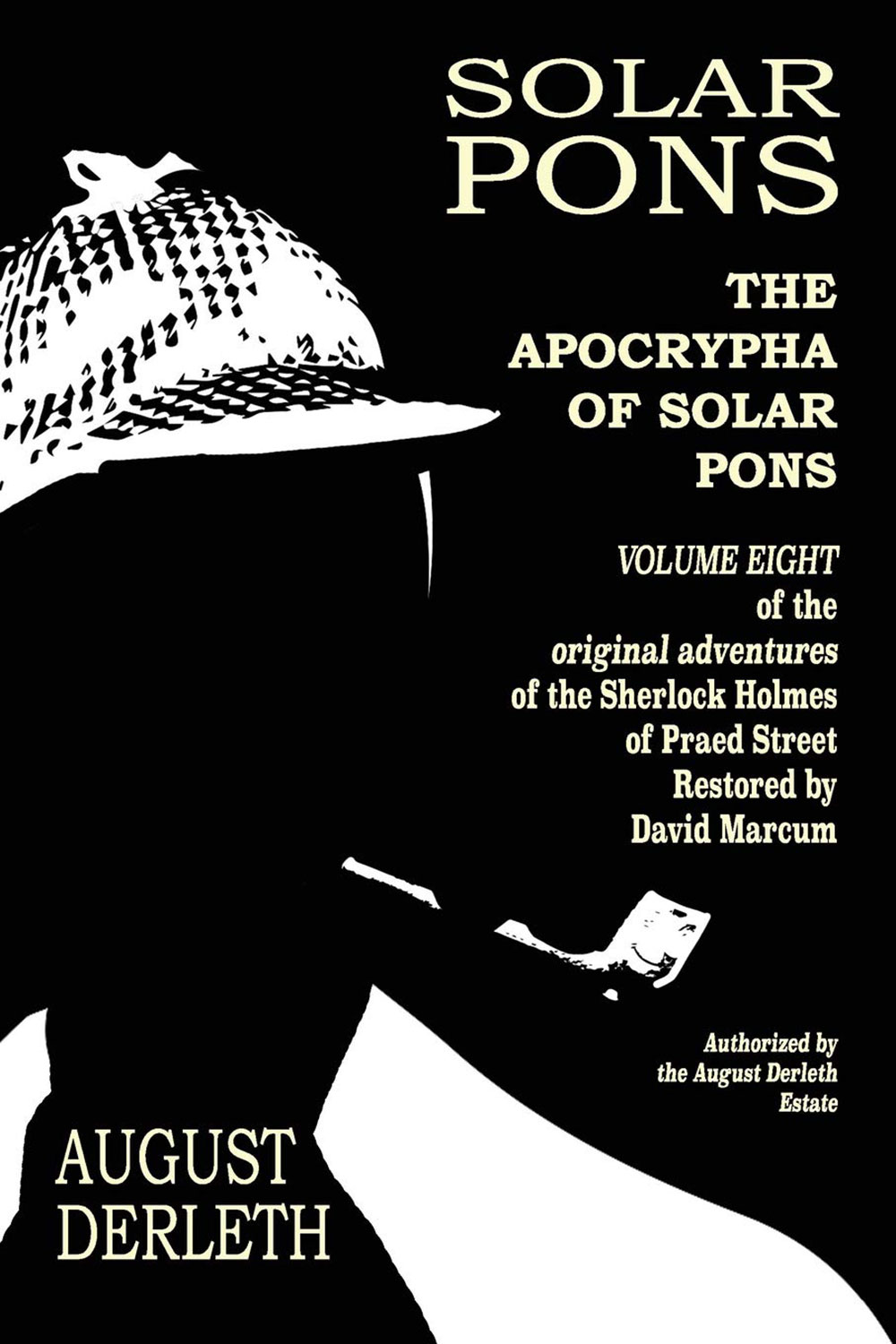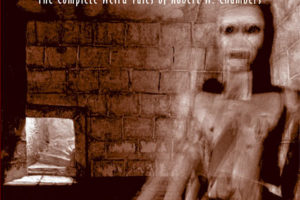And with this posting, I finish my re-reading of August Derleth‘s Solar Pons stories with the eighth and final volume from Belanger Books, The Apocrypha of Solar Pons. Though with The Apocrypha, these works are a first-time read for me.
 This volume collects works that previously were in three volumes: A Praed Street Dossier (1968), The Unpublished Solar Pons (1994), and The Final Adventures of Solar Pons (1998). Pinnacle never published the Dossier, and the other two were only published by Mycroft & Moran, and were hard to obtain. I wasn’t able to. So this volume makes a nice collection of fiction and non-fiction available to a wider audience, but I don’t think everything in these three were included. Those left out were non-fiction pieces by others. As a completist, I really wish they had been included.
This volume collects works that previously were in three volumes: A Praed Street Dossier (1968), The Unpublished Solar Pons (1994), and The Final Adventures of Solar Pons (1998). Pinnacle never published the Dossier, and the other two were only published by Mycroft & Moran, and were hard to obtain. I wasn’t able to. So this volume makes a nice collection of fiction and non-fiction available to a wider audience, but I don’t think everything in these three were included. Those left out were non-fiction pieces by others. As a completist, I really wish they had been included.
First up are two forwards by David Marcum and Derrick Belanger. David’s article is a pretty good overview of how the three original works came to be, and where the pieces in this collection came from. Derrick’s gets into what is and isn’t canon. I’d like to think that the unpublished Derleth pieces may have appeared in a futher Solar Pons collection that had he written enough for before he passed.
Next, we get the non-fiction from the A Praed Street Dossier that collected items from the previousPraed Street Papers, which was an earlier chapbook. This include a “Commentary” by Richard Knox. From Peter Ruber, we have a “Weekend With August Derleth,” which gives a good introduction to Derleth the man and author. Frank Utpatel was an illustrator and friend of Derleth’s who did all the cover artwork to the Mycroff & Moran editions, the cover artwork used for all the Pontine Dossier journals, and other pieces of Pons artwork. Interestingly, he tried doing a Pons comic strip that thankfully didn’t happen. We get a sample of that and some other artwork.
These are followed by a quartet of pieces by Derleth. “The Beginnings of Solar Pons” gives an overview of who Pons is and how Derleth came to create him. “The Sources of the Tales” is what it says, an explanation of where he came up with the titles and ideas for the stories. “Concerning Dr. Parker’s Background” provides information on Dr. Parker, in light of characteristics that are more inline with an American than a Brit. And “The Favorite Pastiches” provides which Pons tales are the favorites of various individuals. I am reminded of articles by pulp fans of their top 10 and worse 10 of various pulp heroes. Something like this as a possible future article in the new Pontine Dossier may be interesting.
Then we get “From the Notebooks of Dr. Lyndon Parker,” which bring these together from several sources. Basically we get entries from this notebook of various short cases that aren’t long enough for a proper tale, though one, “The Adventure of the Bookseller’s Clerk,” would probably count. A seller of used books is bothered by his clerk’s extravagent spending, but there is no evidence of theft. So Pons is asked to look into it and finds there is more to it. I thought the solution was fairly clever.
Next are four cases that had never seen print before appearing in Final Adventures. Of these, three were originally written for the pulps, but never saw print.
In “The Adventures of Gresham Old Place,” a former bank robber approaches Pons for help. He and his associates had turned evidence against another group of robbers, and appear to be menaced. One of them is already dead. But the others in the group are still in jail. Can Pons get to the bottom of things before his client comes to an end?
“The Adventure of the Burlstone Horror,” also referred to as “The Sinister House,” has Pons help Inspector Jamison with a strange case that looks like a serial killer. A headless body is found, and he thinks a doctor is responsible. Then three more headless bodies show up, so his suspect is innocent. Hopefully Pons can show who really did it.
In “The Adventure of the Viennese Musician,” a celebrated pianist dies suddenly during a private performance. And it’s quicky found it was due to a poisoned needle. But who did it, and why?
In “The Adventure of the Muttering Man,” Pons and Parker run into a man wandering the streets of London, muttering the same phrases. Pons realizes there is more to him, and discovered he is a missing man who seems under the affects of drugs and hypnotism. Pons knows of several other missing men who may be connected. Can they figure out what happened to him, who is behind it, and are the others connected as well?
These are followed by a fragmentary story: “The Adventure of the Green Stars.” This first saw print in the Pontine Dossier and later in Unpublished. There was a contest to try to finish this tale. Wonder what came of it? This story features Baron Ernesford Kroll, the closest Pons had to a Moriarty. He appears in two early cases and is hinted at in a couple more.
Then we get a quartet of tales that were co-written with sf author Mack Reynolds (1917-1983), two of which where published in the Magazines of Fantasy and Science-Fiction, and the other not appearing until Final Adventures.
In “Solar Pons, Off-Trail” by Derleth, we learn their origin. Reynolds had written a story using Holmes, and while it was good sf, his characterisation of Holmes was off. So he was referred to Derleth who worked with him and turned it in a Solar Pons tale. They decided to do a dozen such works, but after the second one was delayed, they only wrote two more that never saw print. It would have been interesting had the dozen stories been written, as this would have been enough for another Pons collection. So we might have gotten a whole collection of Reynolds/Derleth Pons stories… if only. The first, due to the time-traveler, is considered “non-canon.” But the other three are.
In “The Adventure of the Snitch in Time,” the first published tale has Pons and Parker consulted by a man claiming to be from 700 years in the future and an alternate time-line where Pons is just a literary character. The traveler needs help in dealing with the crimes of an alternate Moriarty, who is plundering other timelines, but these are not crimes in his timeline. Pons gives a solution and recommends a good lawyer, which the reader should know of.
The second published work is “The Adventure of the Ball of Nostradamus,” and here Pons is looking into a matter of a mercenary who murdered a couple of children. But why? Pons points out a dozen or so similar cases across Europe. So who is the mastermind/madman behind this, and why is he doing this?
Then the next unpublished work is “The Adventure of the Nosferatu,” which has an American approaching Pons about the matter of an un-dead woman who killed his friend and whom he needs to stop. Is this woman actually a “vampire”? And will Pons assist him?
And in “The Adventure of the Extra-Terrestrial,” Pons helps a former client who had become obsessed with the idea that aliens are spying on us and pose a possible threat, though his son thinks he’s crazy. What does Pons determine?
Finally, we get a Sherlock Holmes story by Derleth, “The Adventure of the Circular Room,” which appeared in the Baker Street Journal in 1946. It was later turned into a Solar Pons tale that was included in Memoirs. This is not the first time this is done, so read this alongside the Pons work and see which one you like.
So with that we come to the end of Derleth’s Solar Pons works. There are no more, and there never will be. Next would be to read the Basil Copper works if you haven’t, then move on to the new collections that David Marcum has put together, four so far (or five if you mean specific books). As I haven’t done detailed reviews of two of these collections, these may be next. I hope we will see collections as I think the possibilities are large. How about Pons stories set in America, or entirely in Europe? More with Kroll? What does he do after WWII? With Holmes we know of his ‘retirement’, but this never happened with Pons. Might we get an equivalent to Irene Adler? Some have done stories of Watson by himself, could Parker get a solo tale? Time will tell.



